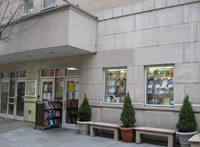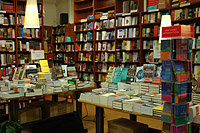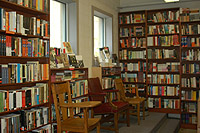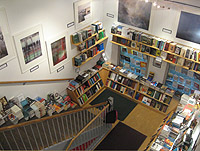- Categories:
Book Culture: New Name, Same Mission
 New York City's Labyrinth Books, an academic bookstore serving Columbia University and the Upper West Side of Manhattan, recently became Book Culture. Owner Chris Doeblin said the new name "concisely suggests what we're about, and it lends itself to anything we'd like to do in the future." Other changes include an expansion of inventory to include children's and travel titles, as well as more magazines and journals.
New York City's Labyrinth Books, an academic bookstore serving Columbia University and the Upper West Side of Manhattan, recently became Book Culture. Owner Chris Doeblin said the new name "concisely suggests what we're about, and it lends itself to anything we'd like to do in the future." Other changes include an expansion of inventory to include children's and travel titles, as well as more magazines and journals.
The 6,500-square foot, two-level location shares a building with the university's post office, and the approximately 50,000-title inventory reflects the bookstore's original academic focus, explained executive manager Annie Shapiro, who previously managed Books on the Common in Ridgefield, Connecticut. "We serve the college students and faculty, but also the community." Along with textbooks and other course-related titles, Book Culture emphasizes serious literary fiction and foreign language titles. It also stocks remainders and used books.
 Doeblin and Cliff Simms co-founded Labyrinth in 1997. They opened a second location in New Haven, Connecticut, and were co-owners of Great Jones Books wholesalers. This past summer, Doeblin bought out Simms' interest in the New York City bookstore, and he recently signed a new 15-year lease with Columbia University. Meanwhile Simms and several family members own the wholesale business and the Labyrinth location in New Haven, and they opened a second Labyrinth, in Princeton, New Jersey, this month.
Doeblin and Cliff Simms co-founded Labyrinth in 1997. They opened a second location in New Haven, Connecticut, and were co-owners of Great Jones Books wholesalers. This past summer, Doeblin bought out Simms' interest in the New York City bookstore, and he recently signed a new 15-year lease with Columbia University. Meanwhile Simms and several family members own the wholesale business and the Labyrinth location in New Haven, and they opened a second Labyrinth, in Princeton, New Jersey, this month.
Since the summer, Doeblin has made a few changes to Book Culture's look. To make the store environment "less austere," he added new flooring to the first floor entrance area, and carpeting and comfortable seating on the second floor.
Non-book items are now also part of the inventory. "We're a little more willing to expand in terms of stock," said Doeblin. "We have had a strong commitment to the idea of the store as strictly an academic and scholarly place, but we've tried adding some sidelines and we've had strong success with them." A line of bags from Milano has been a top seller.
 Children's and travel books were recently added to the mix, too. "We're still on the fence about cookbooks, but children's books are doing terribly well," said Doeblin. "People will come in and buy their books on economics, philosophy, literary criticism, and pick up a few books for their kids." With New York as a departure point, the travel section also has healthy turns, especially the Lonely Planet books, Doeblin noted.
Children's and travel books were recently added to the mix, too. "We're still on the fence about cookbooks, but children's books are doing terribly well," said Doeblin. "People will come in and buy their books on economics, philosophy, literary criticism, and pick up a few books for their kids." With New York as a departure point, the travel section also has healthy turns, especially the Lonely Planet books, Doeblin noted.
Book Culture increased its magazines and literary journals to about 1,000 titles. Doeblin explained, "We put in big, new racks for journals with beautifully lit shelving in the front of the store and expanded our magazines, which coincided with the closing of a local magazine dealer.... The sales are terrific, and the store looks terrific. It makes a wonderful visual presence when you walk in."
Book Culture's schedule of three to five weekly events is shifting slightly to add more general interest authors to the already full roster of appearances by Columbia-affiliated authors, and the store will expand the season into the summer. Mary Gordon (Circling My Mother, Pantheon) recently visited, and Janet Malcolm (Two Lives: Gertrude & Alice, Yale) will appear at the end of the month. In the beginning of December, Book Culture will screen Powell's second film in the Out of the Book series, The Coldest Winter: David Halberstam. The bookstore also showed the first OOTB film, On Chesil Beach. "The last film was so wonderful we wanted to do this one, too," said Shapiro.
 One of the advantages of being an independent bookstore, said Doeblin, is that instituting all of the recent changes didn't require months of seeking approval from corporate HQ or an indecisive board. "We're open to trying a lot of different things," he said. "The result of being an independent is that I feel more confident making changes. I don't have to discuss the meaning, or theme, or effect on our customer base of these changes, or develop a consensus. We can just implement changes and make improvements."
One of the advantages of being an independent bookstore, said Doeblin, is that instituting all of the recent changes didn't require months of seeking approval from corporate HQ or an indecisive board. "We're open to trying a lot of different things," he said. "The result of being an independent is that I feel more confident making changes. I don't have to discuss the meaning, or theme, or effect on our customer base of these changes, or develop a consensus. We can just implement changes and make improvements."
Explaining the bookstore's ongoing modifications, Book Culture sent a letter to friends and customers reminding them that the core purpose would remain consistent. "Our commitment to being a great academic bookstore is still paramount to our mission," Doeblin said. "We're going to try even harder to be the most interesting, complete, and valuable bookstore possible, while trying to be more of a neighborhood store as well, carrying more magazines, mass market titles, and travel guides; generally becoming a more attractive and comfortable place to browse and visit." --Karen Schechner

